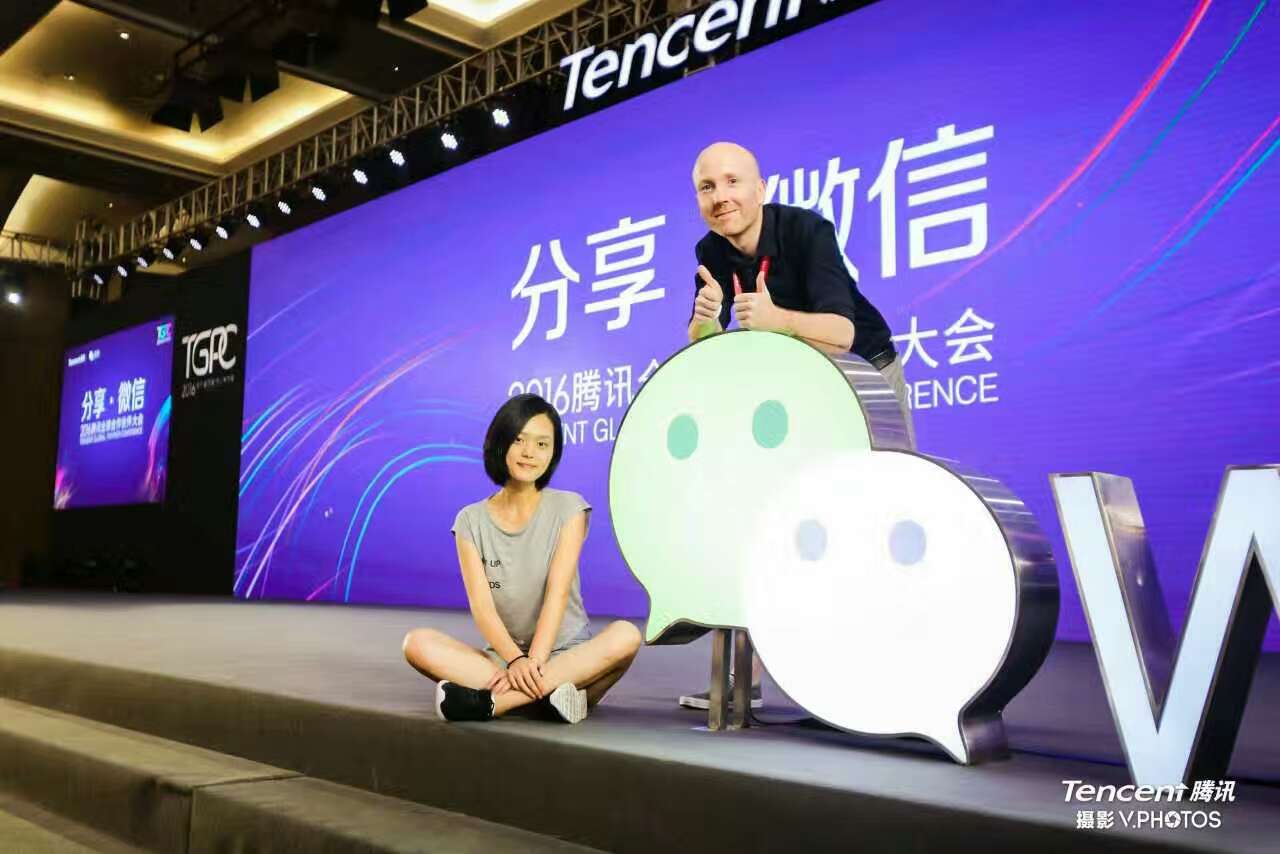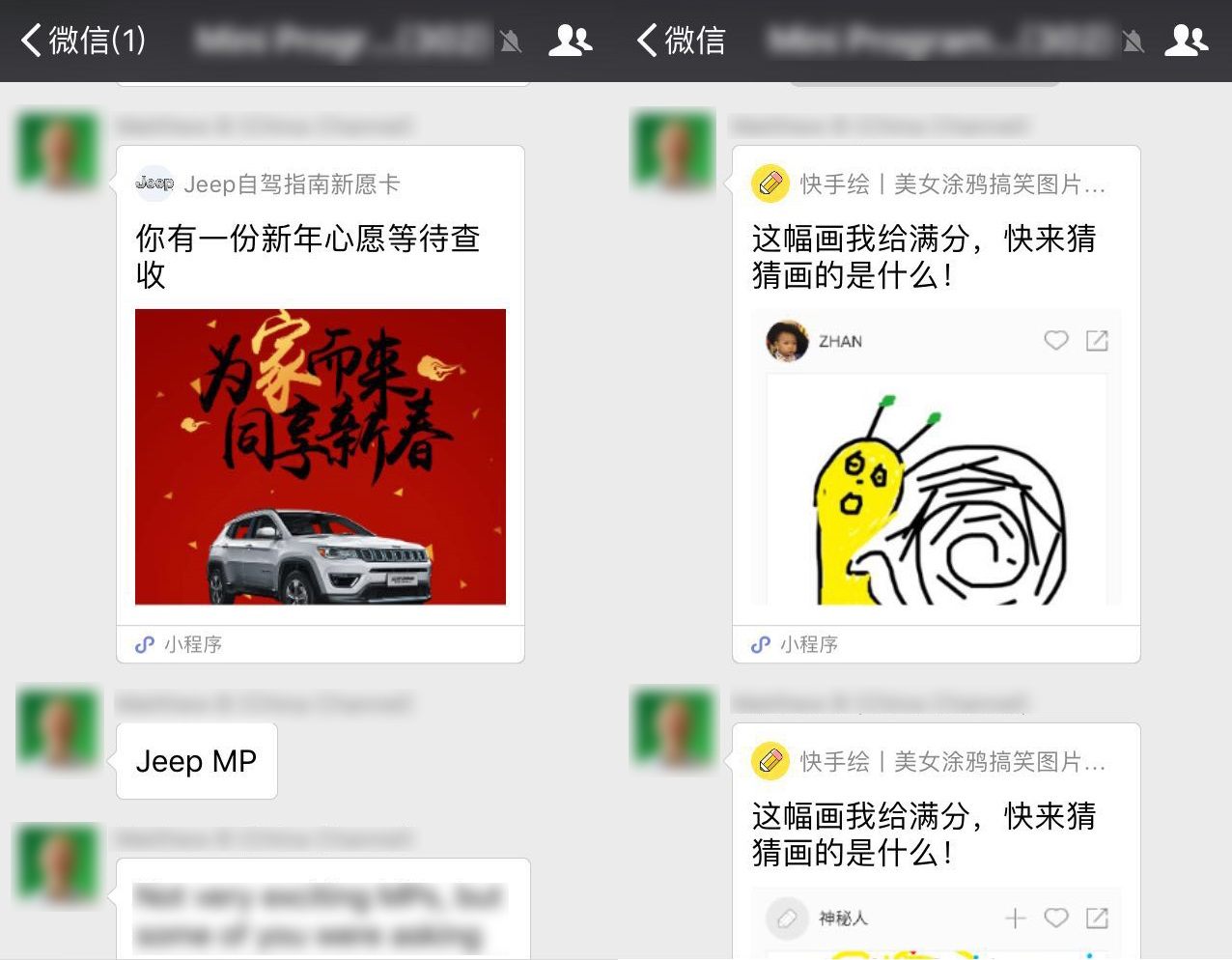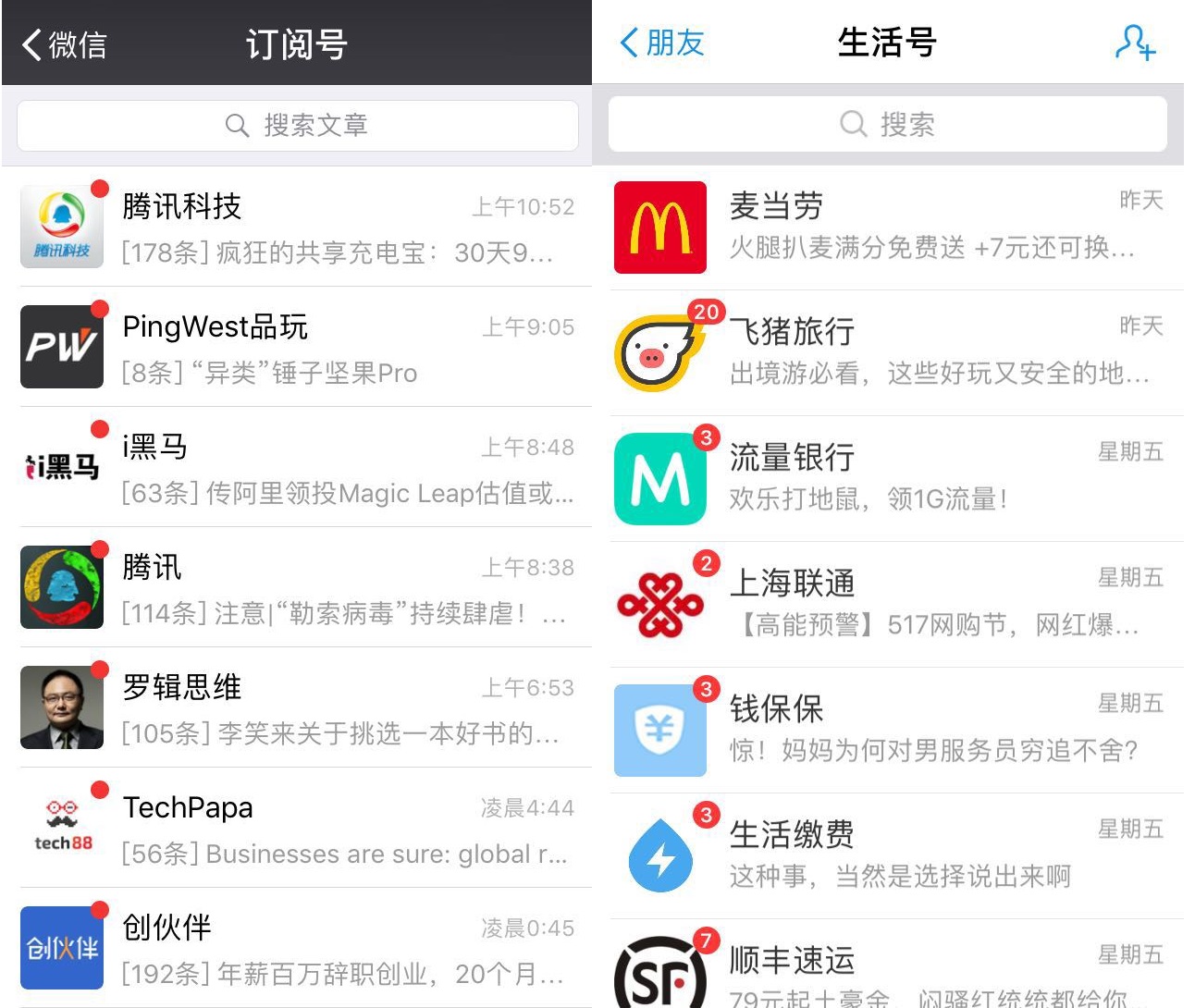
Nichole Zuo and Matthew Brennan, co-founders of China Channel. Photo credit: Tencent.
There are few products in China as influential as WeChat. The Chinese social app dominates the daily life of its 889 million monthly active users – a third of them spend more than four hours on it every day. And with payments, blogs, chat groups, newsfeeds, and an ever-expanding selection of services embedded inside, WeChat is often described as a mobile operating system instead of an app.
Matthew Brennan, co-founder of China Channel, has made a close study of WeChat. He’s one of the few thought leaders on this in the English-speaking world, a veritable Wechat-phile. He follows every release of the app, tracking and analyzing the pulse of its development.
In two years’ time, we might see a considerably different system for businesses on WeChat.
“It’s moving so fast. There’re changes coming out almost every week recently,” he says, referring to WeChat’s latest feature, mini programs. Comparable to Google ‘instant apps,’ mini programs are lightweight applications that don’t require installation and run inside WeChat.
“I think in two years’ time, we might see a considerably different system for businesses on WeChat,” Brennan adds.
See: WeChat wants to use mini programs to tap into offline traffic
Born in London, Brennan has lived in China for the past 13 years. Unlike many expats, he’s spent most of that time outside of major Chinese cities like Beijing and Shanghai. In fact, during the beginning of his experience in China, he lived in Ordos, the notorious “ghost town” in Inner Mongolia, where local farmers have become rich off coal reserves.
Those were interesting times, says Brennan.
“There were so many people running around in crazy cars, like really big land rovers and expensive sports cars,” he recounts, laughing. “They’d just come around and be like, Come and drink baijiu with us, get in the car!”
Last week, I caught up with Brennan during one of his regular circuits through Shanghai to discuss the latest trends in WeChat, common misconceptions around the app, and more. The following is an edited excerpt of our conversation.
How do you explain WeChat to people outside of China?
Often you need to compare it to other platforms [like Facebook], otherwise people get lost.
But when you look at it beyond the fact that they’re both in social, when you look at their business model, when you look at how WeChat works and how Facebook works, there’s very few things that are similar. Although they are definitely competitors on the global scale, how they do what they do is totally different.
I don’t think Tencent really has any interest in doing things the Facebook way.
[For instance], I don’t think Tencent really has any interest in doing things the Facebook way. I’ve come to realize more and more over time that WeChat doesn’t prioritize advertising. They don’t see it as important as Facebook does.
Why do you think that?
When you look at what they’re doing with mini programs, they’re currently releasing features on a daily basis. They obviously see it as hugely important. They’ve never put the same effort into advertising to get it up to a similar level to Facebook.
Instead, they’re much more interested in payments and services.

Paying for Starbucks using WeChat in China. Photo credit: Tencent.
What are some misunderstandings that people – especially those outside of China – have about WeChat?
The common misconception people have is that WeChat is social media, that WeChat’s about content, that WeChat’s about writing articles and getting pageviews. That’s the old way of looking at WeChat.
The correct way of looking at WeChat is it’s a service tool. It’s something that you should be using to provide added value to your processes and the service that you provide around your product. That’s the right way to look at it for most businesses – it depends on what you’re doing.
For example?
Customer service is a big one. Pretty much every business has to offer some form of customer service.
Chinese consumers expect instantaneous customer service.
WeChat is a fantastic customer service tool. You can have one-on-one communication, it’s very personalized, and there’s all these kinds of customer service tools that work really well. It can be better and cheaper than a call center.
Most consumers in China prefer doing it that way [through WeChat]. Chinese consumers expect instantaneous customer service. They’ve had that habit from a long time, since the early days of [ecommerce site] Taobao.
Why do you think Tencent is putting so much effort into mini programs this year?
My guess is they want mini programs to be the main way that businesses have a presence on the platform. It’s not beyond the realm of possibility that they would start actually shutting down some of the functions of [WeChat brand] accounts.
Similar to how WeChat was developed to compete with its predecessor QQ, Tencent’s first desktop-based messaging app?
It’s exactly like that.
Rather than doing QQ Mobile six years ago, they said: okay let’s stop and re-imagine what’s possible because the phone is a game-changer. We need to forget about the past and everything we’ve done with QQ. That’s what they did with WeChat. And it worked incredibly.
It wasn’t the case back then that anyone was saying: oh, I don’t want to use QQ, QQ’s bad. No one was saying that. It was only Tencent who was looking four years down the road and thinking: we can see where things are going and we need to start from zero again. We need to self-destruct.
WeChat has gotten as far as it can go.
I think mini programs are exactly the same. This is exactly the same thing where Tencent’s saying: WeChat has gotten as far as it can go. We’ve got all the users in China. Everyone’s using WeChat – it’s as sticky as it could possibly ever be. We’ve achieved something beyond our wildest dreams when we started it – where do we go from here?
The decision to self-disrupt with opening WeChat six years back at the time must have looked incredibly stupid to most observers, but after a few years it started to look like a masterstroke. Allen Zhang has made it clear he sees mini programs as his masterstroke. When Tencent starts putting big resources into doing something that doesn’t make sense to most people, that’s when you really need to pay attention.
What are some things you expect to see in mini programs going forward?
Allen Zhang, [the creator of WeChat], said that one of the goals they have for previews of mini programs when they’re shared in groups is that they’re going to be ‘alive.’
Right now, it’s just a screenshot of a page. But at some point – probably this year – it will be a live preview.

Previews of mini programs in group chats are static – for now. Left to right: Jeep’s mini program, a Paint-like drawing mini program.
Think about the implications of that. If it’s a video application, you could have videos playing in your WeChat groups. If it’s a delivery application, you might be able to see the delivery driver live on a map coming towards you within a WeChat group. If it’s a simple poll, for example, you’re going to see the numbers change live as people vote.
The possibilities there are huge. That’s one thing we know for sure is coming. And that’s going to open up massive possibilities.
Alibaba is a worthy adversary of Tencent.
[In addition], we may see things like pinning mini programs to the top of a group. Those buttons that you open up within a conversation – you might be able to customize your panel there so that you can have mini programs in those spaces. I think that’s a fairly obvious thing to do, drag and drop in the mini programs that you like using most.
Augmented reality is obviously a bit further away but I think in the mid-term, in a year or two, I don’t think that’s impossible either.
You’re very pro-WeChat obviously – do you think think Tencent could steal Alibaba’s lunch?
Alibaba is a worthy adversary of Tencent. They are a great company. They’ve done amazing things that have added a lot of value to the Chinese nation. They seem to have a really strong company culture. They’re certainly kicking ass at globalizing, and their values are very in line with being a global company.
And that comes from Jack Ma – it comes from the top. His personality is infused in the company.
On the other hand, when you look at what they do with Alipay, it’s hard to have respect for them sometimes because of some of the questionable features they have introduced, [such as Circles, a photo-based chat feature that quickly turned lewd], and how they blatantly copy features wholesale [from WeChat].

Suspiciously similar UI. WeChat on the left, Alipay on the right.
Have you noticed any growing pains at WeChat over the years?
Some people would say that advertising has failed to some degree. Many businesses think their advertising options are too expensive.
Prices have gone down recently, right?
Yeah, they opened up options last year for [small-to-medium enterprises]. It starts at [US$43] so that’s a big change. Still, the cost per follower is relatively high.
But Pony Ma has continuously emphasized the company’s advertising business in its financial releases.
So how I interpret that as a Tencent-watcher is they are of course under pressure from investors. I imagine the team [at Tencent’s headquarters in Shenzhen] probably does want to do more advertising, but the WeChat team is Guangzhou-based and they’ve got a very different culture. And they’re trying to balance those two elements.
You have to look at what they’ve achieved with payments on WeChat for example, and see that in the long run that’s potentially far more valuable than focusing on advertising. Advertising usually degrades the user experience.
What else are you paying attention to this year besides mini programs?
Search. It’s clear there’s going to be big changes in search. There already has been with the search index […] When something happens, you can put it in there and see how it’s doing – is it trending?
It’s clear there’s going to be big changes in search.
Right now it’s just something that happens on the phone. But of course they could open up a desktop version that’s got much richer features and they probably will at some point. They could potentially monetize that with a paid version.
In the last data report, [WeChat] made a big deal out of how everyone’s using it for work now. We saw the enterprise version of WeChat come out last year. Again, version 1.0 of that was pretty basic, now it’s actually really good. It’s come a long way and that’s a trend that isn’t really talked about much.
Converted from Chinese yuan. Rate: US$1 = 6.90.
This post Q&A: WeChat guru Matthew Brennan on the superapp’s next move appeared first on Tech in Asia.
from Tech in Asia https://www.techinasia.com/q-a-matthew-brennan-wechat
via IFTTT
No comments:
Post a Comment